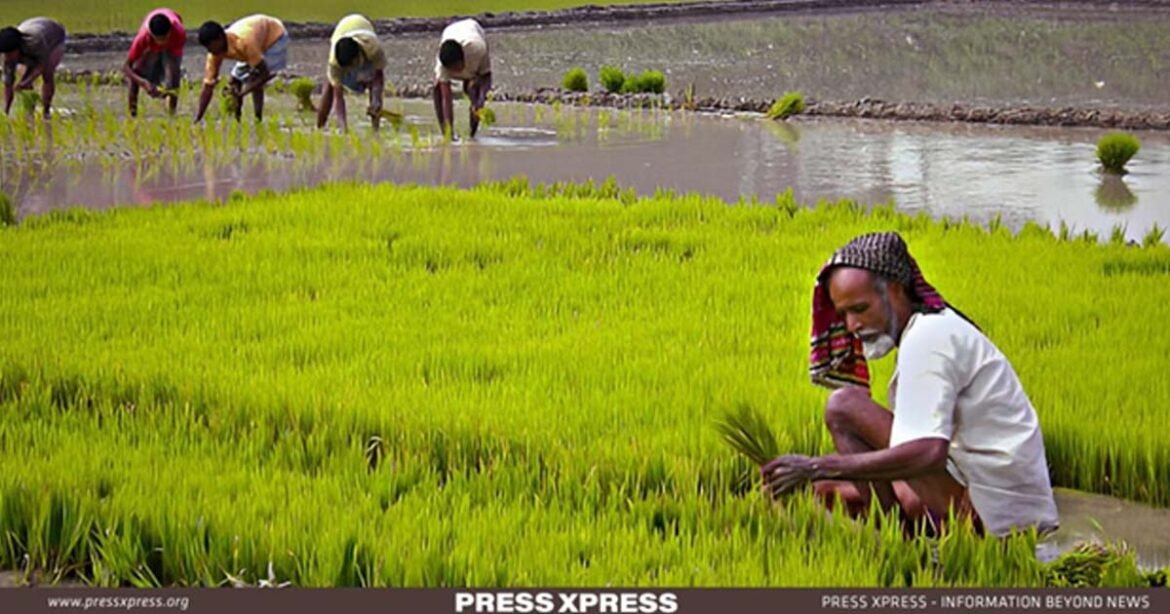The Bangladesh government’s recent announcement of allocating Tk 385 billion for agricultural development over the next three years has stirred optimism and highlighted the nation’s commitment to agricultural advancement. With a targeted average annual growth rate of 10% in the sector by the 2025-26 fiscal year, this investment underscores the pivotal role of agriculture in ensuring food security and fostering inclusive economic growth, as outlined in the ‘Medium Term Macroeconomic Policy Statement (2023-24 to 2025-26)’.
Bangladesh’s Agricultural Development
- Govt’s Allocation: Tk 385 billion over 3 years
- Targeted Growth Rate: 10% annually by 2025-26
You can also read: Power Grid’s Q3 Profit Soars on Stable Exchange Rates
After gaining independence, Bangladesh’s agriculture sector took the forefront as the leading force behind its economy, contributing to nearly 60 percent of the GDP. This sector plays a pivotal role in providing livelihoods and employment opportunities for its people, serving as a cornerstone of the economy by reducing poverty and ensuring food security. Presently, Bangladesh is directing its efforts towards bolstering nutrition security and increasing its food exports.
‘Medium Term Macroeconomic Policy Statement (2023-24 to 2025-26)’
The ‘Medium Term Macroeconomic Policy Statement (2023-24 to 2025-26)’ is a document that outlines the macroeconomic policies and strategies of a government for the medium term, typically for a period of three years.
This statement is placed before the Parliament in accordance with section 11 of The Public Money and Budget Management Act, 2009. It is prepared by the Macroeconomic Wing of the Finance Division, Ministry of Finance, Government of the People’s Republic of Bangladesh.
The statement includes key indicators, demand side contributions to growth, GDP growth by sector, GDP growth rate, and the medium term macroeconomic framework. It also provides details about revenue collection performance, main sources of revenue, composition of non-tax revenue, revenue performance, and revenue projection in the medium term.
Contributions of Fisheries and Livestock to GDP and Livelihoods
- Fisheries Sector
- Contribution to GDP: 2.53%
- Livelihoods for over 12% of the population
- Livestock Sector
- Contribution to GDP: 1.91%
- Livelihoods for over 12% of the population
Agriculture remains crucial for the livelihoods of the majority, particularly in rural areas. To bolster food production and resilience against challenges, the government’s strategy entails developing high-yield and adversity-tolerant crop varieties, expanding mechanization and irrigation, and enhancing access to affordable inputs such as seeds and fertilizers.

Efforts to modernize agriculture through technology are underscored in the policy document. These efforts encompass prioritizing surface water for irrigation to conserve resources, integrating renewable energy solutions, and utilizing remote sensing for crop monitoring.
The government persists in supporting the agricultural sector through subsidies, financial incentives, and technological innovations to establish a sustainable and self-reliant agricultural framework.
Additionally, the fisheries and livestock sub-sectors make noteworthy contributions, accounting for 2.53% and 1.91% of GDP, respectively, while providing vital protein sources and livelihoods for over 12% of the population. Milestones in these domains include achieving self-sufficiency in fish, meat, and egg production, with milk production anticipated to achieve similar status. Furthermore, these sectors significantly contribute to foreign exchange earnings through exports.
Looking forward, the Ministry of Livestock and Fisheries intends to initiate development projects to augment production capacities, adopt advanced management technologies, and enhance conservation efforts, particularly for young hilsa fish (‘jatka’).

Water Resource Management: A Key to Sustainability
Water resource management is a key focus area due to its critical role in ensuring sustainable agriculture. Ongoing initiatives aim to enhance surface water availability by excavating water bodies and promoting coastal afforestation to secure fair shares of water from transboundary rivers.
Given the substantial economic risks posed by climate change, which are projected to reduce GDP by 6.8% by 2030, the government has prioritized comprehensive strategies to mitigate these impacts. The Mujib Climate Prosperity Plan is designed to empower vulnerable sectors and communities with the necessary tools to bolster resilience and stability against climate-related disruptions.
Through these diverse efforts, Bangladesh is taking proactive measures to safeguard and advance its agricultural legacy in the face of evolving global challenges.
Why is water management crucial in agriculture?
Water management is crucial in agriculture due to various factors such as depleting aquifers, increasing water demands, and the impact of climate change. Agriculture is the leading sector in water usage, especially in countries like India, where over 90% of water is utilized for agricultural purposes. With global population growth and declining per capita water availability, efficient water management practices are essential to ensure sustainable agricultural production.
Precision water management systems, including techniques like micro-irrigation and conservation agriculture, play a vital role in reducing water footprints and enhancing water productivity in crop production systems. Efficient water management not only conserves water resources but also improves crop yields, resource-use efficiency, and overall sustainability in agriculture, making it a critical component for addressing water scarcity challenges in the sector.
Agriculture’s Contribution to GDP and Employment
Over the past two decades (1999-2019), there has been a consistent annual growth of 3.54 percent in the value of agricultural production. As previously highlighted, this sector continues to be the primary source of employment, supporting 40 percent of the workforce and maintaining its status as the largest employment sector. The agricultural industry alone employs more than 40.6 percent of the population, either directly or indirectly.

Agriculture also indirectly contributes by supplying essential raw materials for industrial processing. Currently, numerous agro-processing industries rely entirely on agriculture for their essential raw materials, such as rice milling, sugar, tea, fruit juice, spices, and more.
Conclusion
In navigating the complexities of evolving global challenges, Bangladesh stands resolute in its commitment to safeguard and advance its agricultural heritage. Through decisive investments, technological innovations, and sustainable practices, the nation charts a course towards agricultural excellence, ensuring food security, economic prosperity, and resilience amidst a rapidly changing world.


